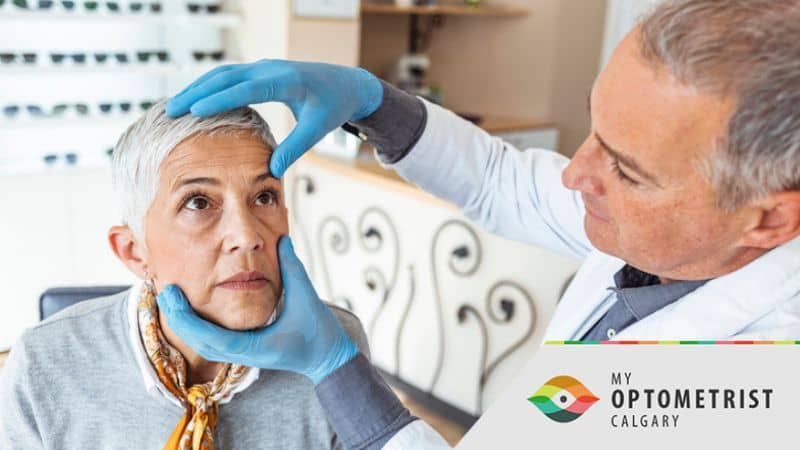
As you age, the risk of developing eye conditions increases. Typically, eye conditions begin to develop around age 50 with contributing factors including lifestyle and genetics. Many different eye conditions cause permanent vision impairment if not diagnosed and treated early. To help keep your eyes healthy as you age, it is imperative that you have regular eye exams. During a senior eye exam, your optometrist will search for any signs of developing eye conditions. If they detect any eye health problems, your optometrist will create a treatment plan to slow or stop the progression of the condition to retain as much of your vision as possible. Here are some of the most common eye conditions that develop after 50.
Senior Eye Exams: What An Optometrist Is Looking For
Cataracts
Cataracts tend to start developing between the ages of 40 and 50 and they get progressively worse over time. Cataracts are the clouding of the crystalline lens as proteins in the lens break down. When this happens, less light is able to enter the eye and vision can become impaired. When you visit your optometrist for a senior eye exam, they will look at your lens to determine if there are any signs of protein breakdown.
Glaucoma
This term refers to a group of eye conditions that damage the optic nerve. Glaucoma is often caused by increased pressure within the eye and it can be screened for during senior eye exams. Glaucoma begins to develop without any symptoms, so people who have it are often unaware until it is detected during an eye exam or if vision impairment has begun. If your vision is damaged by glaucoma, there is no way to reverse this. Learn more about this eye condition by reading Everything You Need To Know About Glaucoma. Glaucoma typically begins to develop around age 60.
Age-Related Macular Degeneration
Also called AMD, this eye condition is the deterioration of the macula, which is the part of the eye responsible for central vision. When a person develops AMD, they will gradually lose their central vision but will still retain their peripheral vision. This condition limits a person's ability to perform tasks such as reading, driving, or identifying faces and the vision impairment it causes is permanent. As the name implies, one of the major risk factors for the development of age-related macular degeneration is age. The chances of developing this condition increase significantly after age 50. Visiting your optometrist for a senior eye exam will allow your optometrist to diagnose developing AMD so that you can address and treat this condition early and prevent significant loss of central vision.
Retinal Detachment
Your retinas are the light-sensitive part of your eyes. They are at the back of each eye and they detect light and convert it to images. Your retinas are vital to your vision. As you age, the fluid inside of your eye (called vitreous fluid) may change in texture and shrink. This can cause retinal detachment as the retina gets pulled with the vitreous fluid. If your retina detaches, it will be cut off from its blood supply and can die if not reattached. Retina detachments can happen suddenly, or they can happen slowly over time. Some signs of retinal detachment include an increase in floaters, the appearance of a grey sheet over your vision, flashes of light, and blurred vision. During a senior eye exam, your optometrist will view your retina to ensure it is in good health and securely attached.
Protect Your Eyes With Senior Eye Exams
Eye exams are always an important part of protecting your health and vision, but as you age senior eye exams are even more important. You are more likely to develop a variety of eye conditions as a senior, and the only way to determine if treatment is needed is through regular eye exams. At My Optometrist, our eye doctors in Calgary and Three Hills will examine your eyes and determine a diagnosis during a comprehensive senior eye exam so that you can understand your eye health and receive the treatment you need. To book an eye exam with one of our eye doctors, contact My Optometrist at one of our three locations at Health First in SE Calgary, Sunridge in NE Calgary, or Three Hills, AB. You can also call us or fill out the online contact form.
FAQ
Q: What should I expect during my eye exam?
A: Typically, your doctor will begin by reviewing your personal and family health history to see if there are any hereditary problems of eye disease, vision loss, high blood pressure, cancer, etc. Then your doctor will begin conducting vision tests, coordination of eye muscles, peripheral vision, pupil response, colour testing, eyelid health and function, and measurement of fluid pressure in the eye to detect glaucoma.
Q: How does aging affect my vision?
A: As we get older, the lenses in our eyes become less flexible and may become slightly discoloured resulting in the inability to focus on objects clearly or differentiate between certain colours. This is why seeing your optometrist more regularly as you get older is important to prevent vision loss and eye diseases.
Q: Q: How often should I get an eye exam?
A: The Canadian Association of Optometrists recommends that you visit your optometrist for a comprehensive eye exam:
- Ages 6-19: Annually
- Ages 20-39: Once every two or three years.
- Ages 40-64: Every two years
- Ages 65+: Annually